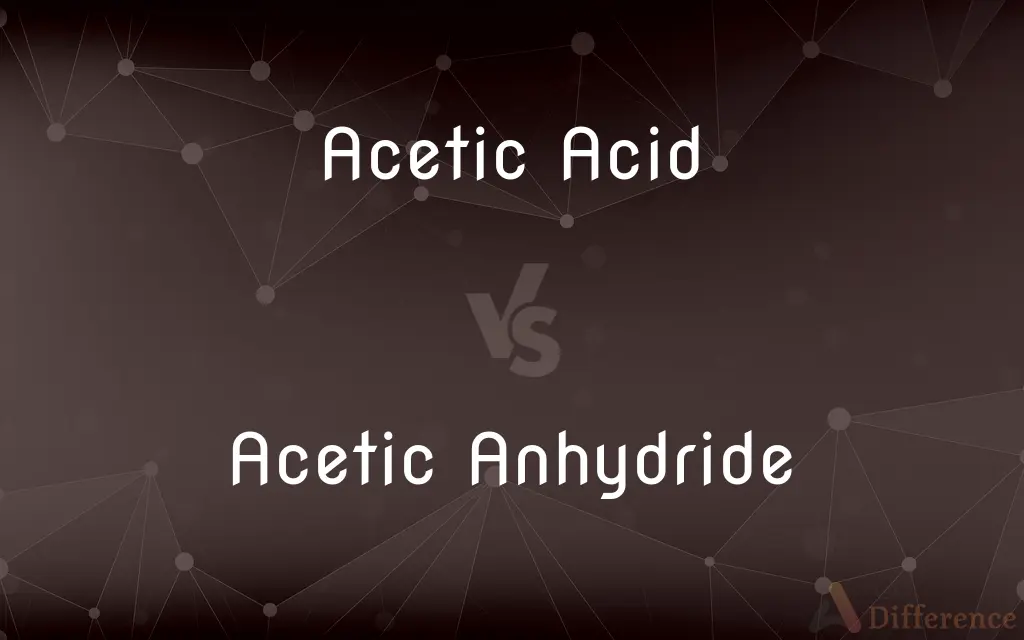Acetic Acid vs. Acetic Anhydride — What's the Difference?
By Tayyaba Rehman — Published on November 6, 2023
Acetic acid is a weak organic acid, often found in vinegar, while acetic anhydride is its anhydrous form used mainly for making acetyl compounds.

Difference Between Acetic Acid and Acetic Anhydride
Table of Contents
ADVERTISEMENT
Key Differences
Acetic acid and acetic anhydride are both organic compounds, but they possess distinct characteristics and applications. Acetic acid, with its chemical formula CH₃COOH, is a weak acid commonly recognized as the primary component of vinegar. Besides culinary use, it's vital in industrial processes, serving as a chemical reagent for synthesizing various compounds. Its acidic nature contributes to its sour taste and pungent smell.
Acetic anhydride, with the formula (CH₃CO)₂O, is derived from acetic acid. As the name suggests, it's the anhydrous (without water) form of acetic acid. Rather than having a hydrogen atom bound to the oxygen (like in acetic acid), acetic anhydride has an acetyl group. This compound is primarily used in acetylation processes, where it's employed to introduce an acetyl group into a molecule.
In a chemical context, while acetic acid donates protons (acting as an acid), acetic anhydride functions as an acetylating agent. The former is a liquid that mixes well with water, whereas the latter reacts vigorously with water, reverting back to acetic acid.
Additionally, while acetic acid is commonplace in household settings (e.g., vinegar), acetic anhydride is more confined to industrial applications due to its reactivity and specific use in creating derivatives of acetic acid. Both, however, play crucial roles in the chemical industry, serving varied purposes in synthesis and production.
Comparison Chart
Chemical Formula
CH₃COOH
(CH₃CO)₂O
ADVERTISEMENT
Primary Use
Culinary (as vinegar) and chemical synthesis
Acetylation processes in chemical synthesis
Reaction with Water
Miscible with water
Reacts with water to form acetic acid
Physical State
Liquid
Liquid
Presence in Household
Common (vinegar)
Rare
Compare with Definitions
Acetic Acid
Possesses a pungent smell and sharp taste.
The strong smell of acetic acid can be recognized when opening a vinegar bottle.
Acetic Anhydride
Highly reactive, especially with water.
When acetic anhydride comes into contact with water, it produces acetic acid.
Acetic Acid
A weak organic acid known for its presence in vinegar.
Acetic acid gives vinegar its characteristic sour taste.
Acetic Anhydride
The anhydrous form of acetic acid used for acetylation.
Acetic anhydride reacts with water, making it important to store it properly.
Acetic Acid
A carboxylic acid with the formula CH₃COOH.
When diluted, acetic acid is safe for culinary uses.
Acetic Anhydride
Primarily found in industrial settings due to its specific applications.
The manufacture of certain pharmaceuticals requires acetic anhydride.
Acetic Acid
An important industrial chemical used for synthesis.
The production of synthetic fibers involves the use of acetic acid.
Acetic Anhydride
An acetylating agent with the formula (CH₃CO)₂O.
In the lab, acetic anhydride is used to transform specific chemicals through acetylation.
Acetic Acid
Used as a solvent in chemical processes.
Some reactions require acetic acid as a solvent to proceed efficiently.
Acetic Anhydride
A reagent in the synthesis of many organic compounds.
Acetylsalicylic acid, known as aspirin, is produced using acetic anhydride.
Common Curiosities
Which compound is used for acetylation in organic synthesis?
Acetic anhydride is commonly used for acetylation.
Can acetic anhydride be found in household products?
Rarely. Due to its reactivity, it's mainly used in industrial applications.
Is acetic anhydride safe to mix with water?
No, acetic anhydride reacts vigorously with water, forming acetic acid.
What is acetic acid commonly found in?
Acetic acid is the primary component of vinegar.
Is acetic acid considered a strong acid?
No, acetic acid is a weak acid.
Is vinegar the same as acetic acid?
Vinegar contains acetic acid, but it also has water and other components.
What happens when acetic acid and acetic anhydride are mixed?
They can mix, but any presence of water will cause the anhydride to convert to acetic acid.
Why is acetic anhydride called "anhydride"?
Because it's the dehydrated form of two acetic acid molecules.
Can acetic acid be used as a solvent?
Yes, acetic acid is used as a solvent in various chemical reactions.
In which industries is acetic anhydride most commonly used?
It's prominent in the pharmaceutical, textile, and chemical industries.
How can you describe the taste of acetic acid?
Acetic acid has a sour taste, characteristic of vinegar.
What's the primary commercial use of acetic anhydride?
It's widely used in the synthesis of various organic compounds, including aspirin.
Can you safely consume pure acetic acid?
No, pure acetic acid is corrosive and shouldn't be ingested.
How is acetic acid produced commercially?
It's often produced through the fermentation of ethanol or the oxidation of acetaldehyde.
Are there any safety concerns with acetic anhydride?
Yes, it's corrosive and should be handled with care, especially as it reacts with water.
Share Your Discovery

Previous Comparison
Front Office Executive vs. Receptionist
Next Comparison
Zinc Picolinate vs. Zinc GluconateAuthor Spotlight
Written by
Tayyaba RehmanTayyaba Rehman is a distinguished writer, currently serving as a primary contributor to askdifference.com. As a researcher in semantics and etymology, Tayyaba's passion for the complexity of languages and their distinctions has found a perfect home on the platform. Tayyaba delves into the intricacies of language, distinguishing between commonly confused words and phrases, thereby providing clarity for readers worldwide.
















































